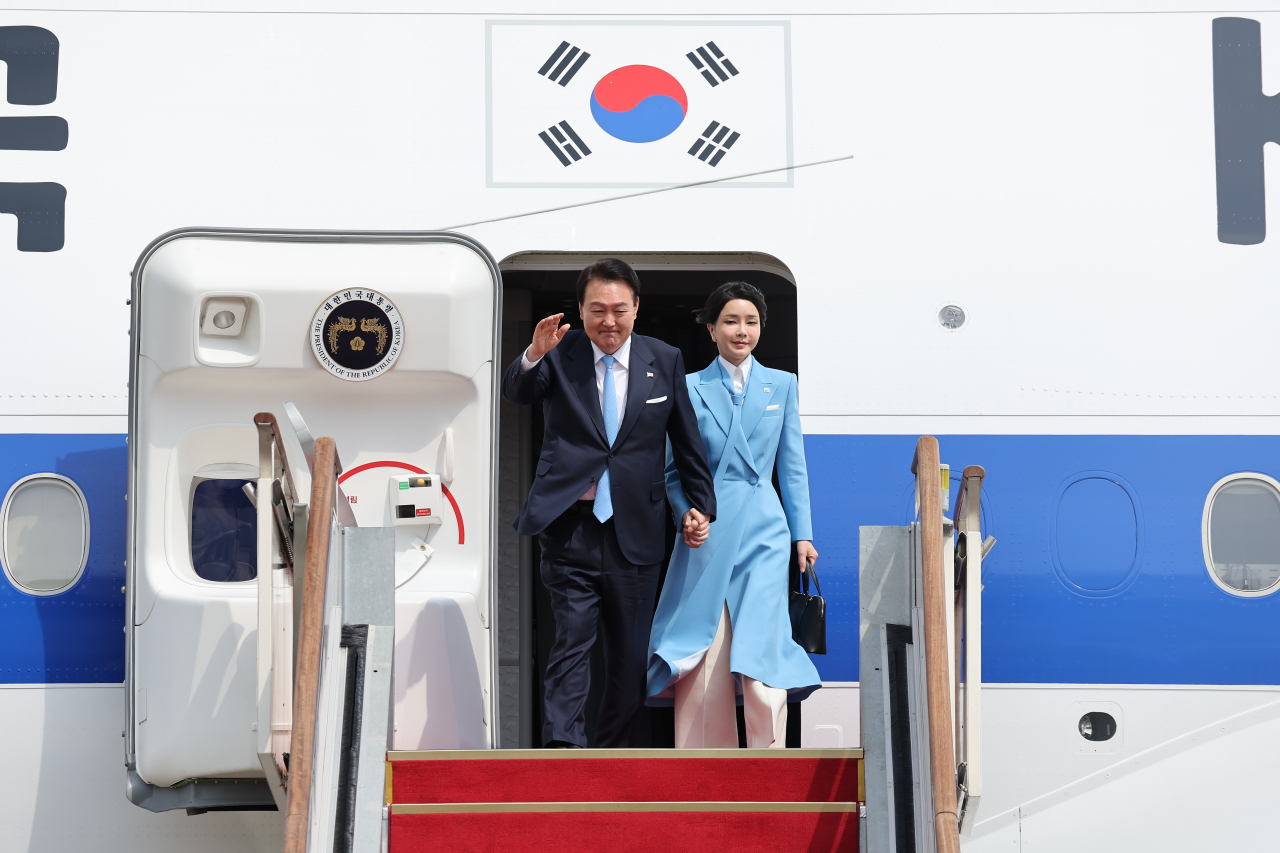 |
President Yoon Suk Yeol (left) waves at Seoul Air Base in Seongnam, Gyeonggi Province, Sunday, alongside his wife Kim Keon Hee as they return from a state visit to the US. (Yonhap) |
President Yoon Suk Yeol returned to his office Sunday after a six-day trip to the US, touting an accord to give South Korea a bigger say in a potential US nuclear response to North Korea as an upgrade to the existing Seoul-Washington mutual defense treaty.
The Washington Declaration, which gives Seoul a seat at the table on using Washington’s nuclear force in exchange for swearing off an independent nuclear buildup, is a major shift from the previous administration’s approach to Pyongyang that heavily relied on diplomacy.
Analysts who have supported a harder line on the isolated country, which continues to defy international sanctions over its nuclear and missile programs, hailed the accord announced at a summit held Wednesday in Washington between Yoon and US President Joe Biden.
Wi Sung-lac, South Korea’s former chief nuclear envoy on North Korea, said the Yoon administration “has chosen the right path for a nonnuclear state to beef up defense against Pyongyang.”
A Nuclear Nonproliferation Treaty withdrawal would not only make South Korea a rule breaker, like North Korea, but test Asia’s fourth-largest economy, with no help to enlist for bypassing potential international sanctions, according to Wi.
During a meeting Friday at Harvard University’s Kennedy School, Yoon said Seoul could develop its own nuclear weapons “within a year at the earliest,” but “political and economic considerations” were pushing the country to abide by the NPT.
“South Korea and the US shook hands on the declaration on a one-on-one basis, which tells me this is an accord more effective than the one binding NATO,” Yoon said.
A Nuclear Consultative Group, set up under the new accord, is Seoul’s commitment not to violate the NPT, Yoon added.
A Nuclear Consultative Group brings together senior Seoul and Washington officials to regularly discuss categorizing cases where nuclear weapons might be used. The South Korean military will learn how to support US nuclear operations, with Seoul’s fighters escorting American warplanes capable of nuclear strikes.
“We’ve clearly reinforced deterrence. The question now is how we work to make a really functioning Nuclear Consultative Group, which is by far the most advanced body we have seen when it comes to jointly responding to North Korea,” Wi told The Korea Herald on Sunday, referring to activities accompanying such regular meetings.
Tabletop exercises or simulations involving the allies’ forces will take place as the US more frequently deploys its strategic assets like nuclear ballistic missile submarines to the South, though Washington has not promised to make the deployment routine. The US says it does not intend to reverse its 1991 withdrawal and redeploy tactical nuclear weapons in the South, either.
While South Korea and the US will not exercise “joint command over actual US nuclear weapons,” Seoul can see “almost the same results from such ‘nuclear sharing’” if the two allies set up a well-coordinated NCG, with the US deeply committing itself to deploying its strategic assets, said Park Won-gon, a professor of North Korean Studies at Ewha Womans University.
Shortly after Wednesday’s summit, Edgard Kagan, senior director for East Asia and Oceania on the US National Security Council, said the latest nuclear accord is not an endorsement of “de facto nuclear sharing,” dismissing a previous description of the Washington Declaration by Yoon’s office that it “essentially makes South Koreans feel like they share the weapons.”
The declaration was the highlight of the summit that marked 70 years of ties, but skeptics say it hardly alleviates growing doubts in South Korea about about America’s will to use its nuclear weapons to defend its ally. They say the accord has only refashioned “all the rhetoric about such ‘extended deterrence.’”
Those skeptics have also warned of alienating China and Russia, the two biggest supporters of North Korea, which have claimed that Seoul and Washington are setting off a new arms race in the region.
Following the summit, Beijing and Moscow issued statements warning that “any attempts to raise tension hampering stability in the region should be stopped.”
“I don’t see immediate clashes with those countries but in the long-term the Yoon administration should come up with ways to manage ties with Beijing and Moscow. We can’t risk worsening relations with them,” Park said of Yoon’s policy on those countries.
So far the Yoon administration has yet to unveil a clear blueprint on such engagement, in stark contrast with his push for closer ties with the US.
Wi Sung-lac, the former chief nuclear envoy who also later served as ambassador to Russia, stressed a “pre-coordinated response” that makes matters involving China and Russia also “integral to Yoon’s broader foreign policy."
“The way we have dealt with those countries has been largely an after-the-fact engagement. Given their potential political clout, we just can no longer treat them like that,” Wi said. “Give each of them a fair share of our attention. The US will still be our biggest ally but we can’t go all in on Washington.”







![[Today’s K-pop] Blackpink’s Jennie, Lisa invited to Coachella as solo acts](http://res.heraldm.com/phpwas/restmb_idxmake.php?idx=644&simg=/content/image/2024/11/21/20241121050099_0.jpg)